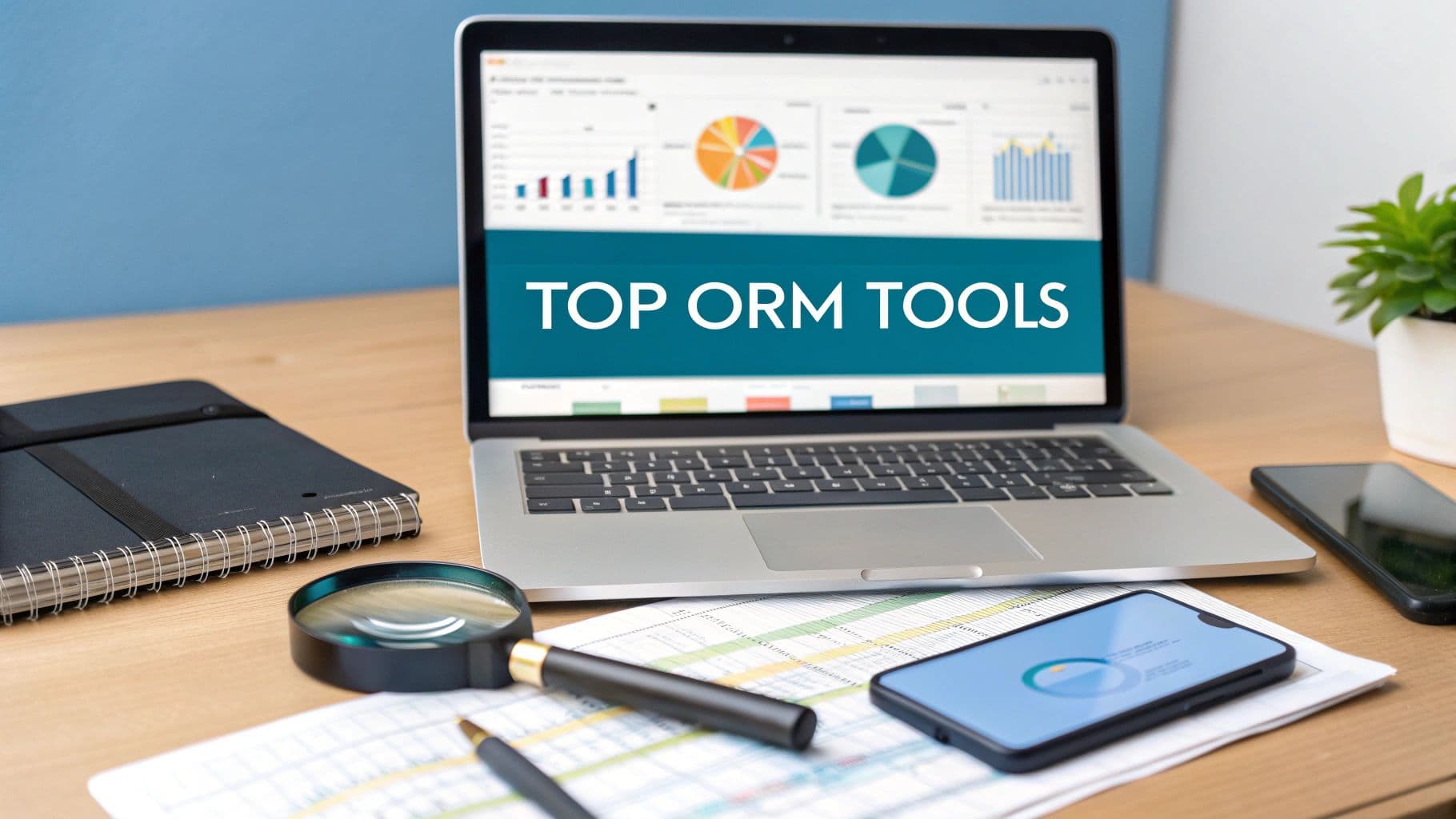
As a founder, your reputation is everything. It's the silent ambassador that works 24/7, shaping what prospects, investors, and future hires think before they ever speak to you. But in a world of instant feedback, managing that reputation can feel like trying to catch rain in a bucket. A single negative comment or a misleading review can hijack your narrative.
This isn't just another generic list of tools. It's a practitioner's guide from one founder to another. We're pulling back the curtain on how we do reputation management at BillyBuzz—the actual alert rules, the specific subreddits we monitor, and the response templates that get us results. To fully grasp the importance and scope of the tools discussed, it's essential to first understand the core principles of Online Reputation Management itself.
We’re cutting through the marketing fluff to give you what you actually need:
- Founder-to-Founder POV: What works and what’s a waste of time and money for a growing company.
- Actionable Tactics: We'll share specific filters, keywords, and workflows we use internally.
- Clear Use Cases: How to leverage these tools for lead gen, customer feedback, and crisis management.
- No-BS Pricing: A breakdown of costs so you can make a decision that fits your runway.
Let's dive in and find the right tool to help you own your story.
1. BillyBuzz
Full disclosure, this is our tool. We built BillyBuzz because the existing best online reputation management tools were either too expensive, too broad, or missed the mark for founders who live and die by community-led growth. Our focus is laser-sharp: turn Reddit conversations into customers. We use context-aware AI to find people discussing specific problems your product solves, seeking recommendations, or complaining about your competitors. It’s about finding intent, not just keywords.
Instead of manually scanning dozens of subreddits, you get high-intent leads delivered straight to Slack. We get a real-time alert, jump into the conversation, and offer genuine help. This isn't about spamming; it's about being the first to provide value when someone needs it most.
Key Features & Our Internal Use Case
At BillyBuzz, our alert rules are hyper-specific. Here’s one that works for us:
- Subreddits:
r/saas,r/startups,r/Entrepreneur - Keywords:
("social listening" OR "reputation management" OR "brand monitoring") AND ("tool" OR "software" OR "recommend") - Negative Keywords:
-free,-internship,-job
This simple rule filters out noise and delivers conversations where people are actively looking for a solution like ours.
- AI-Powered Monitoring: Finds contextually relevant discussions, not just keyword matches. We surface customer pain points and brand sentiment.
- Real-Time Alerts: We use the Slack integration religiously. A new lead hits our
#reddit-leadschannel, and the first person available jumps on it. Speed is our advantage. - Competitor Tracking: We monitor mentions of our competitors to find dissatisfied users and highlight our unique value prop in relevant threads.
- AI Reply Suggestions: We use this as a starting point. It generates a solid, context-aware draft, and then we add our human touch to make it authentic.
Who Is It For?
This tool is for us—early-stage founders, lean marketing teams, and anyone focused on community-led growth. It's for founders who see Reddit not as a time-sink but as a goldmine for product feedback, customer acquisition, and building an authentic brand. The positive discussions we engage in often rank on Google, giving us a long-term SEO boost. If you want to turn Reddit into a predictable growth channel, this is for you.
Why It Stands Out: While other tools give you a firehose of mentions, we give you a filtered stream of opportunities. Our AI's relevancy scoring is the secret sauce, finding genuine purchase intent where others just find noise.
| Feature | Details |
|---|---|
| Primary Platform | |
| Pricing | Starts at $19/month (billed annually) for the "Founder" plan. |
| Free Trial | Yes, a 3-day free trial is available. |
| Money-Back Guarantee | Yes, a 30-day guarantee is offered. |
| Best For | Startups, solo founders, and marketing teams focused on community-led growth. |
Pros:
- Advanced AI identifies high-intent conversations, not just keyword mentions.
- Real-time multi-channel alerts ensure timely engagement.
- Flexible pricing built for founders, not enterprises.
- Builds lasting SEO value through high-ranking Reddit content.
Cons:
- Exclusively focused on Reddit. You’ll need other tools for a multi-platform strategy.
- Some advanced AI features are still in development as we build in public.
Learn more about how BillyBuzz uses AI for monitoring brand reputation on billybuzz.com.
2. Reputation
Reputation is a beast, built for multi-location enterprises like car dealerships or retail chains. If you're managing hundreds of Google My Business pages, this is one of the best online reputation management tools out there. It centralizes control over reviews, listings, and social media, preventing the logistical nightmare of managing a distributed brand presence. Their "Rep Score" is a clever KPI that rolls up performance data into one metric, so HQ can see which locations are crushing it and which are lagging.
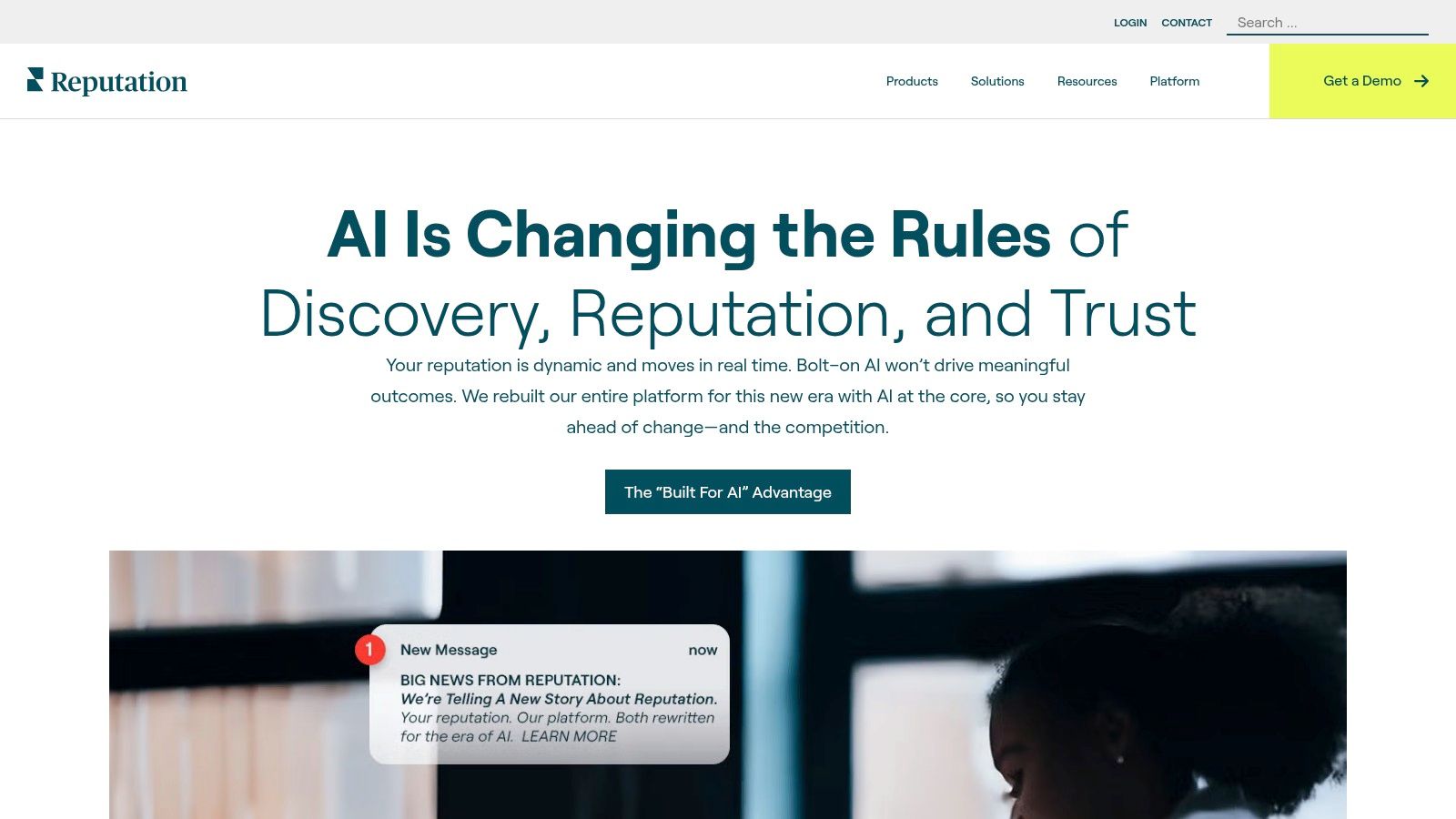
The platform’s strength is streamlining complex workflows. For example, a regional manager can create approved review response templates. As a founder, you can replicate this scrappily. At BillyBuzz, we have a simple Google Doc with three template categories:
- Positive: "Thanks for the kind words! So glad to hear [feature] is helping you with [use case]."
- Neutral/Confused: "Appreciate the feedback. Could you share a bit more about what you were trying to do? Happy to help."
- Negative: "Sorry to hear you had this experience. That's not what we aim for. I'm looking into this now and will follow up via DM to get it sorted."
This ensures our voice is consistent, even when different team members are responding.
Key Details & Takeaways
- Best For: Enterprise-level companies and franchises with tons of physical locations.
- Pricing: Custom quote-based. Expect enterprise-level pricing.
- Key Feature: The Rep Score gives a 30,000-foot view of your brand's health across all locations.
- Limitation: Complete overkill for a startup or SMB. The cost and complexity are prohibitive.
Visit Website: https://www.reputation.com
3. Birdeye
Birdeye wants to be your all-in-one customer experience hub, making it one of the best online reputation management tools for businesses that want to consolidate their tech. It combines review monitoring with listings management, web chat, SMS marketing, and even payment processing. It’s built for local service businesses (think dentists, plumbers) who need to manage the entire customer journey, not just what people say online.
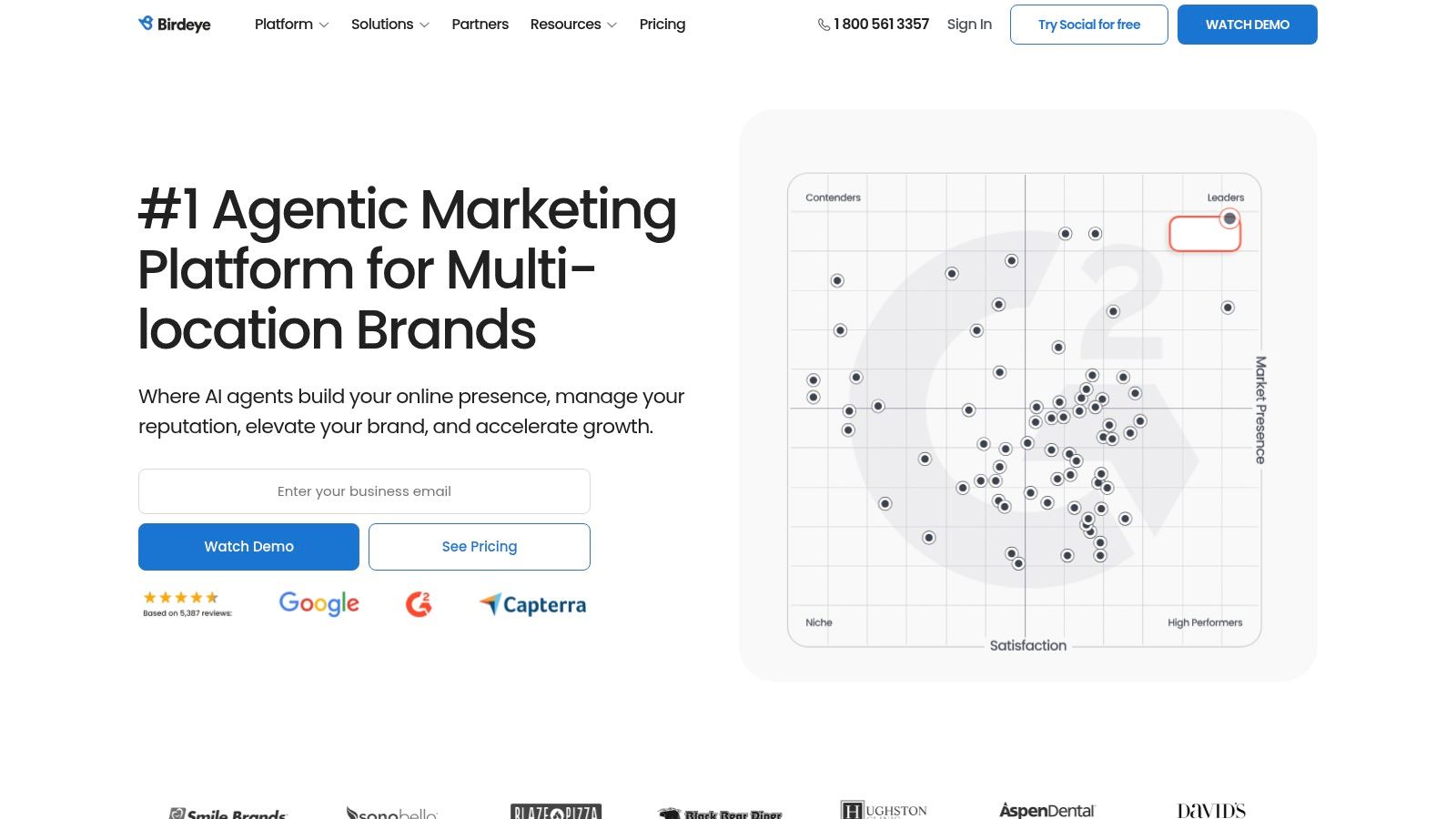
Its unified inbox is the core value prop, pulling messages from web chat, texts, and social media into one place. This lets a small team handle multiple channels without juggling tabs. At BillyBuzz, we achieve a lean version of this with a dedicated #customer-inbox Slack channel. We pipe in alerts from our social tools and support tickets, creating a central command center for our team to triage and respond to everything. It's less automated but achieves the same goal: nothing gets missed.
Key Details & Takeaways
- Best For: SMBs and multi-location businesses that need a full customer experience suite.
- Pricing: Custom quote-based. You have to talk to sales.
- Key Feature: The Unified Inbox aggregates all customer comms, which is a huge time-saver.
- Limitation: It’s a lot of tool if you just need reputation monitoring. The lack of public pricing is also a hurdle for early-stage planning.
Visit Website: https://birdeye.com
4. Podium
Podium is laser-focused on turning online chatter into cash for local businesses. It's one of the best online reputation management tools because it directly connects reviews to revenue. Built for main-street businesses, it integrates review management with powerful tools like SMS marketing and payment processing. The philosophy is simple: a great review isn't the end of a transaction; it's the start of a new one.
Its unified inbox, which combines Google messages, social DMs, and texts, is killer for local businesses that need to respond to new leads in minutes. While we're a SaaS company, we've adopted Podium's principle of rapid, centralized response. Our dedicated Slack channel for alerts ensures that customer questions don't languish in an inbox. We treat every interaction as a potential conversion or a chance to build a loyalist.
Key Details & Takeaways
- Best For: Local, service-based businesses (mechanics, dentists, home services) where converting leads quickly is key.
- Pricing: Custom quote-based. No public pricing, so you have to schedule a demo.
- Key Feature: The AI-powered omnichannel inbox that centralizes conversations and helps draft responses, dramatically cutting response times.
- Limitation: Heavily geared toward local B2C. If you're a B2B or SaaS company, the feature set is less relevant.
Visit Website: https://www.podium.com
5. Yext
Yext is the OG of listings management, and it's still one of the best online reputation management tools for ensuring data accuracy across the web. Its core job is to sync your business info—name, address, phone (NAP)—across a huge network of sites like Google, Apple Maps, and Yelp. This "single source of truth" is foundational for local SEO and customer trust.
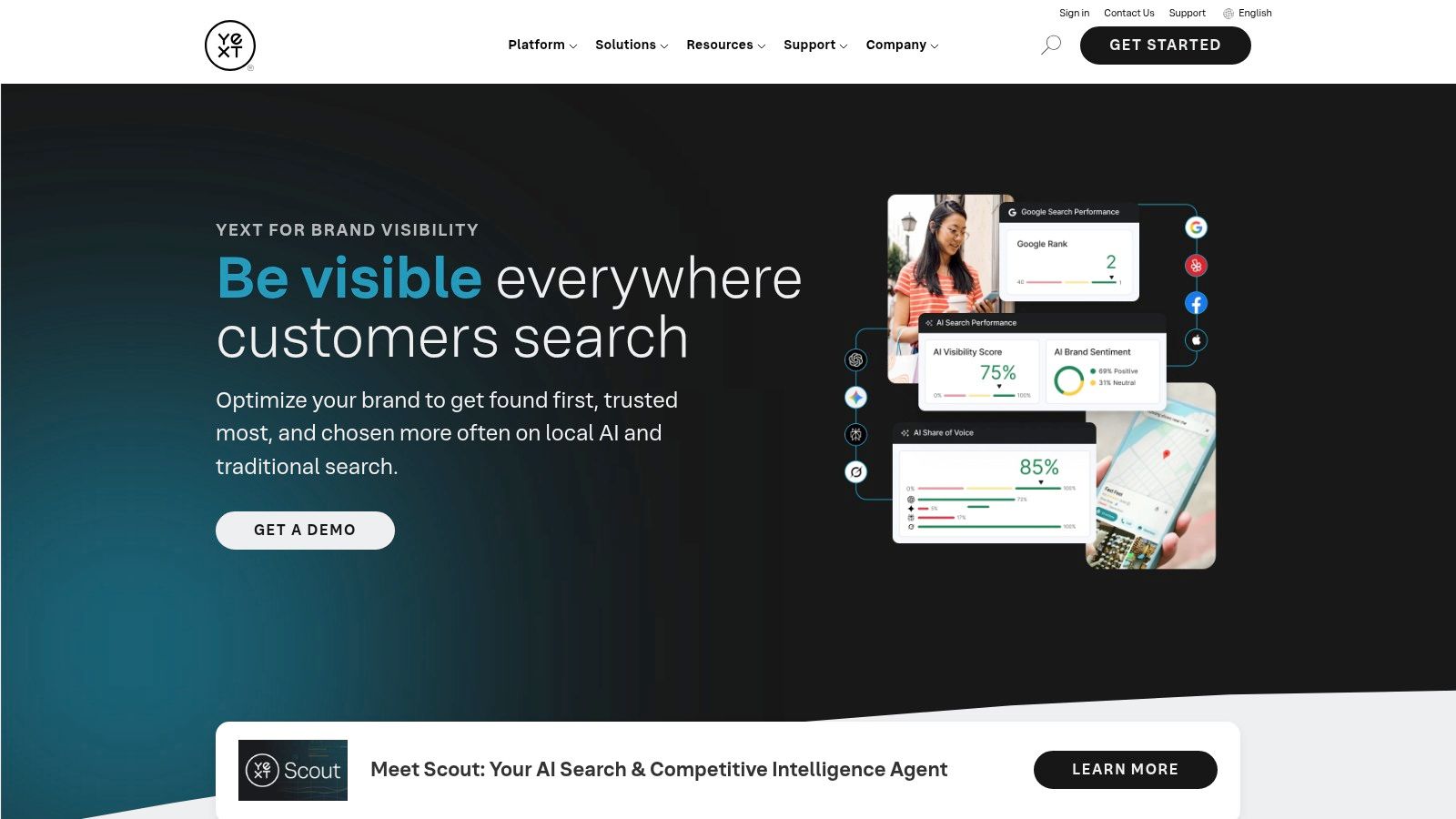
The real magic is in its direct API integrations. Updates happen in near real-time, which is impossible to do manually at scale. For a founder, this is about preventing unforced errors. A customer showing up to your old address is a terrible first impression. While Yext is the automated solution, you can DIY this early on. Create a master spreadsheet of your top 15-20 listings (G2, Capterra, Google, etc.) and assign someone to check and update them once a quarter. It's manual, but it gets the job done.
Key Details & Takeaways
- Best For: Any business with a physical address, from a single coffee shop to a national franchise.
- Pricing: They have public pricing for small businesses (starting around $299/year), but enterprise is quote-based.
- Key Feature: The Publisher Network offers direct API control over your listings on 200+ platforms.
- Limitation: Can be pricey for a small business, and the ROI is most tangible for brick-and-mortar brands.
Visit Website: https://www.yext.com
6. Sprout Social
Sprout Social is a social media management powerhouse that has rightfully earned its spot among the best online reputation management tools by integrating review management and social listening. It's for teams who want their social marketing and reputation monitoring in one place. The Smart Inbox is the star, unifying messages, mentions, and reviews from places like Facebook and Google My Business into a single, filterable stream.
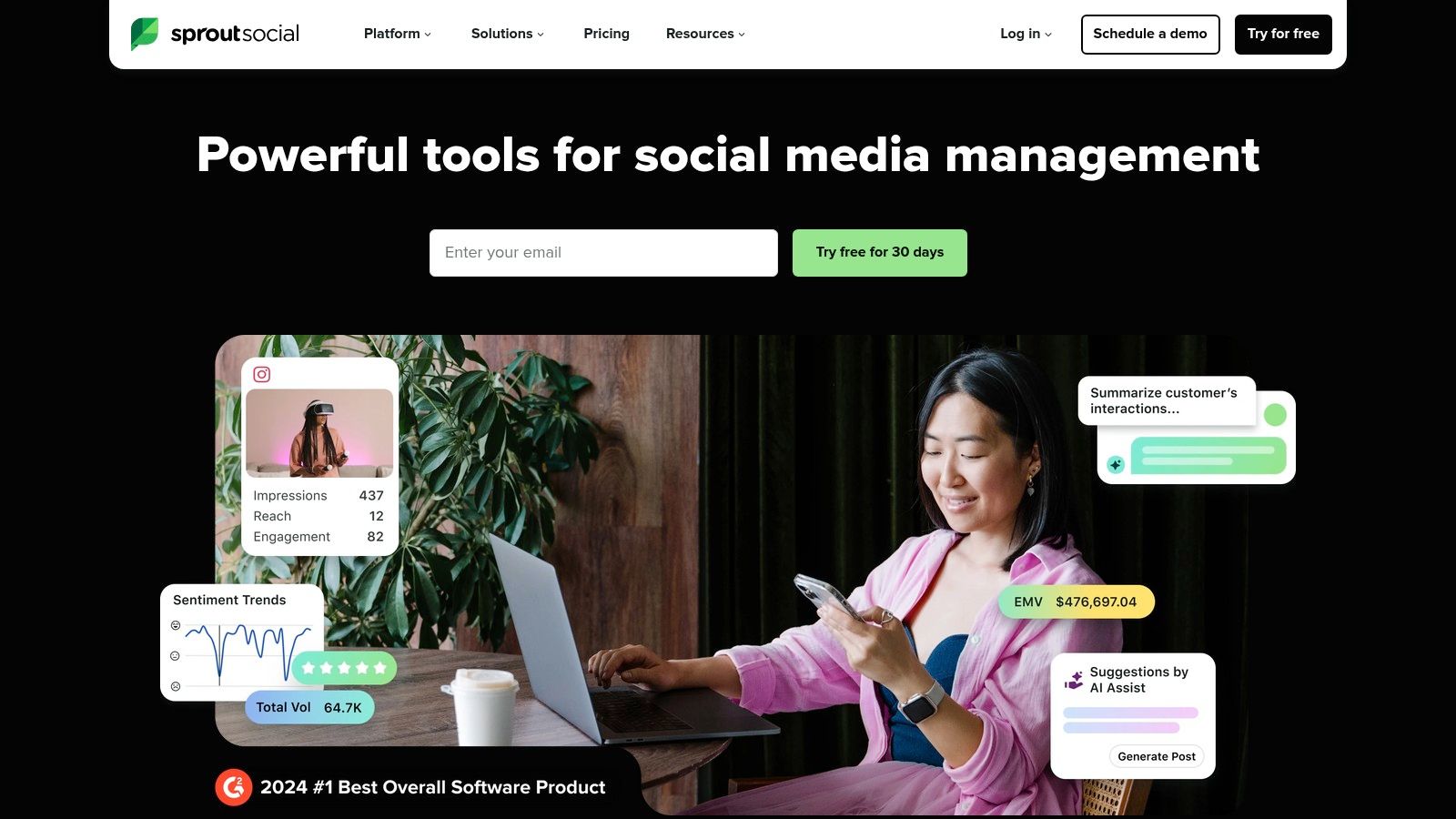
The platform’s reporting is slick and helps you understand what content is resonating and what the overall sentiment around your brand is. For founders who need to go deeper, their social listening add-on is powerful but pricey. It lets you track keyword trends across the web, which is key for proactive reputation management. You can learn more about social media monitoring efforts to get the most from these features. The clean UI and collaboration tools make it easy for teams to assign tasks and approve responses.
Key Details & Takeaways
- Best For: Marketing teams that want a polished, all-in-one social media and review management tool.
- Pricing: Starts at $249/month per user. A 30-day free trial is available.
- Key Feature: The Smart Inbox centralizes all social comms, making it easy to manage conversations and maintain a history.
- Limitation: The per-user pricing gets expensive fast, and the best listening features are a paid add-on.
Visit Website: https://sproutsocial.com
7. Brandwatch
Brandwatch is an enterprise-grade consumer intelligence platform. It’s one of the best online reputation management tools for big brands that need to analyze massive volumes of social data. It goes way beyond mention tracking, providing deep analytics on sentiment, conversation trends, and potential PR crises. It’s about turning the firehose of public opinion into strategic insights.
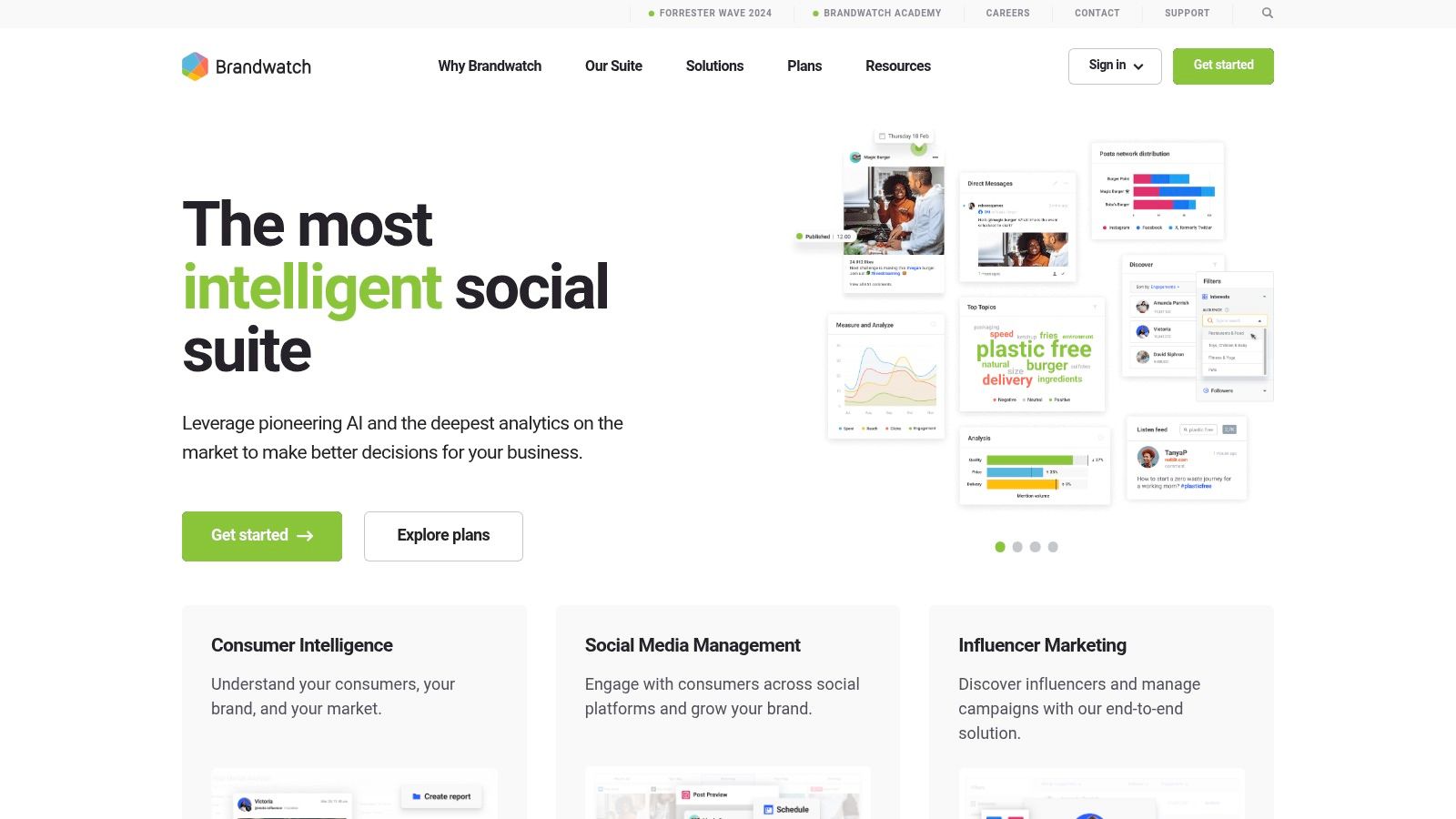
Its advanced query builders are incredibly powerful. A global brand could set an alert for any mention of its product alongside words like "recall" or "unsafe" that also shows a sudden spike in negative sentiment. As a founder, you can replicate a tiny piece of this with Google Alerts. At BillyBuzz, we have an alert set up for "BillyBuzz" AND (bug OR issue OR problem OR broken). It’s not as sophisticated, but it’s free and helps us catch critical feedback early.
Key Details & Takeaways
- Best For: Large enterprises and global brands that need deep consumer intelligence and crisis monitoring.
- Pricing: Custom quote-based. Think big enterprise budget.
- Key Feature: Advanced consumer research capabilities that can sift through billions of data points for hyper-specific insights.
- Limitation: Way too complex and expensive for 99% of startups and small businesses.
Visit Website: https://www.brandwatch.com
8. Meltwater
Meltwater is a media intelligence platform that excels at monitoring brand mentions across a huge landscape, including premium, paywalled news sites. This is its key differentiator and what makes it one of the best online reputation management tools for PR-focused teams. Getting an alert the moment your brand is mentioned in Bloomberg or The Wall Street Journal is a massive advantage.
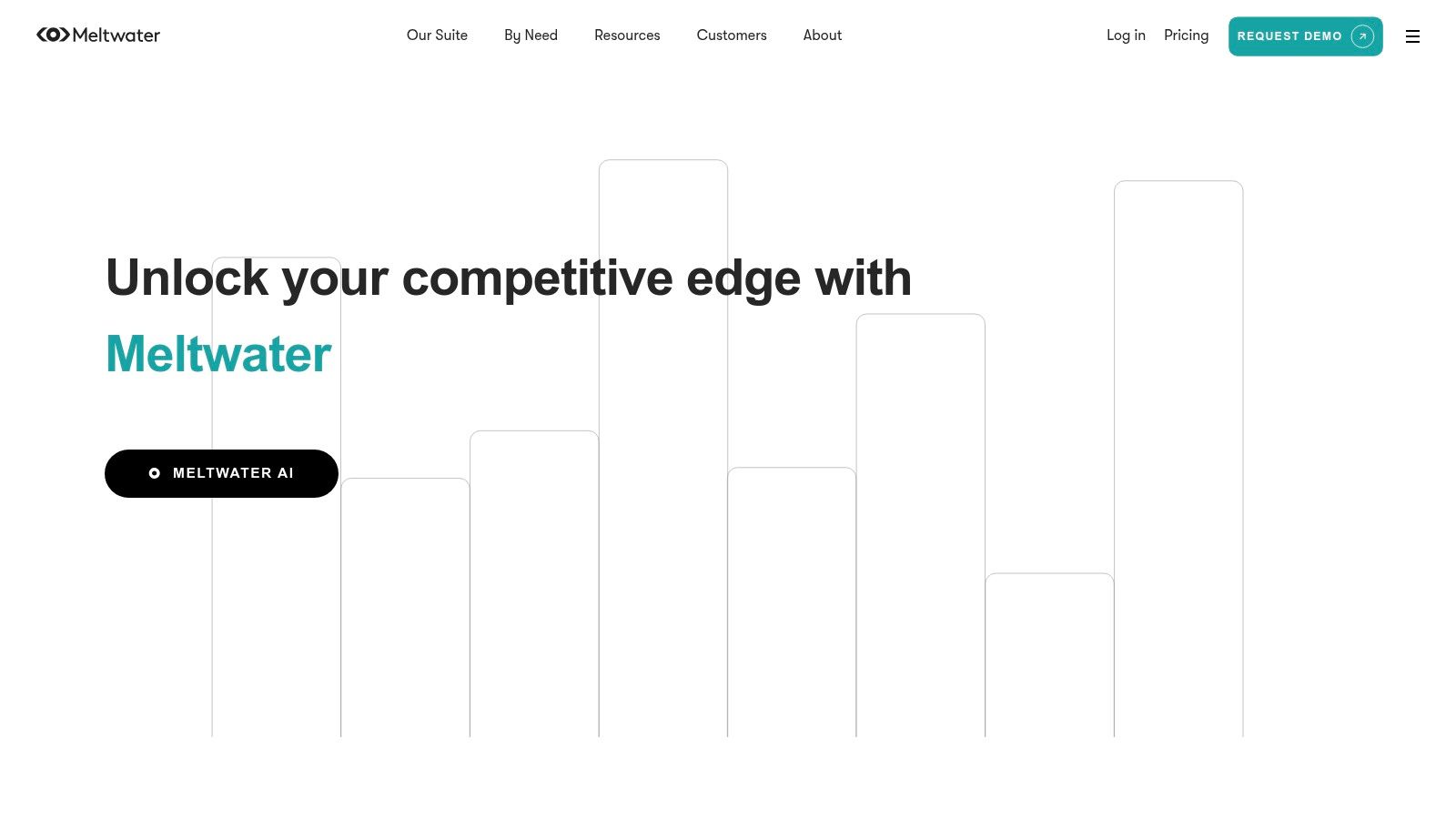
The platform is built for enterprise PR and marketing departments, offering robust social listening and sentiment analysis. For a founder, the full suite is overkill, but the principle of casting a wide net is sound. We do a low-fi version of this by combining Google Alerts for news with targeted keyword monitoring in industry-specific subreddits. This helps us catch conversations across different media types, ensuring we don't operate in a bubble.
Key Details & Takeaways
- Best For: Enterprise PR teams and agencies that need to track brand mentions across premium news sources.
- Pricing: Custom quote-based, with substantial annual contracts.
- Key Feature: Access to premium news content gives you a more complete picture of your public narrative.
- Limitation: The enterprise price tag and complexity make it a non-starter for most small businesses.
Visit Website: https://www.meltwater.com
9. Brand24
Brand24 is all about real-time social listening, making it one of the best online reputation management tools for businesses that need to be fast on their feet. It catches brand mentions as they happen across social media, blogs, and forums. For startups and SMBs, its transparent pricing and unlimited user access are huge wins. It removes the friction of having to decide who gets a seat.
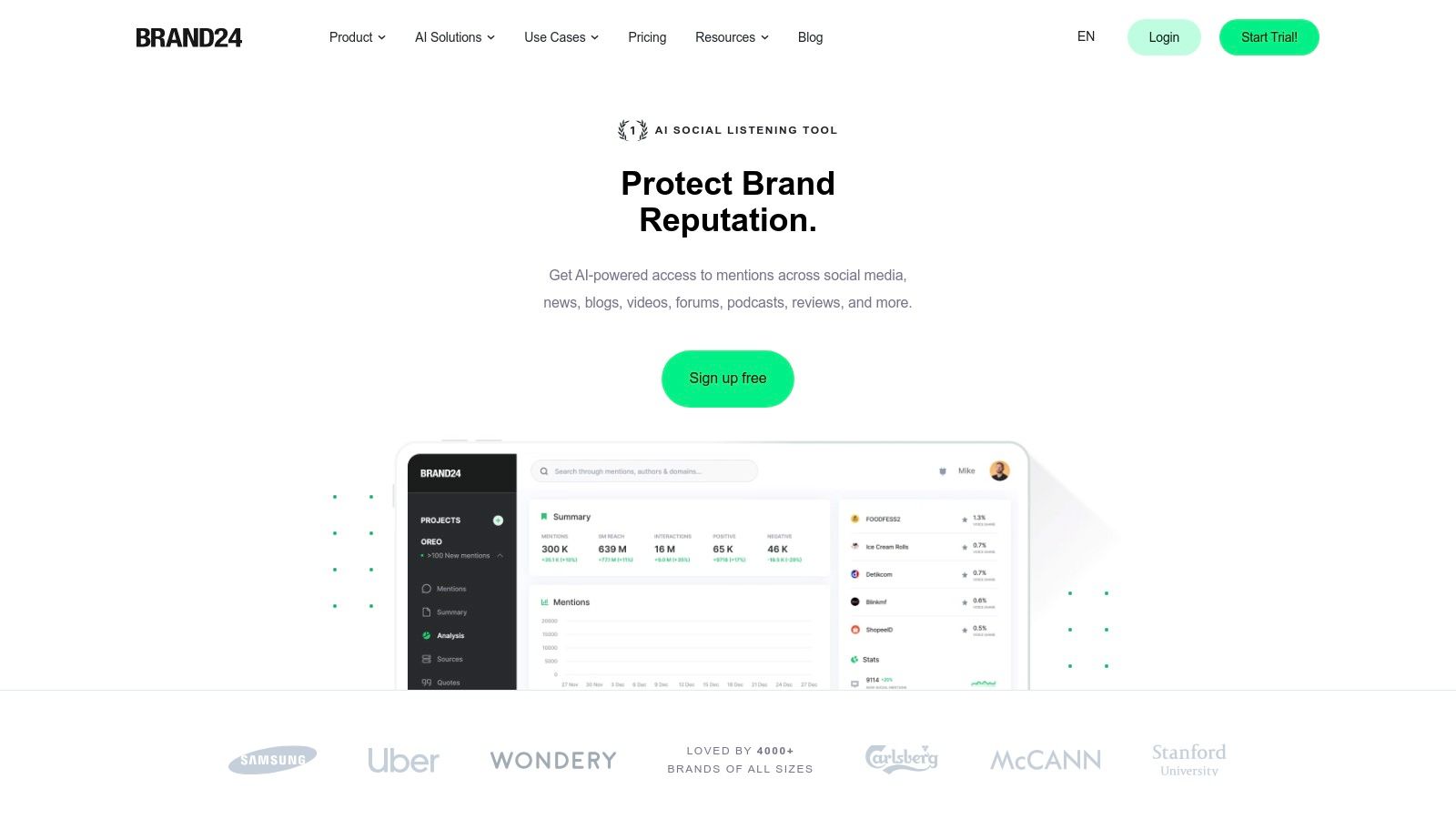
The platform's alerts are highly actionable. We use a similar concept at BillyBuzz with our Slack integration. We have a "storm alert" rule that pings us if our mention volume suddenly spikes by more than 300% in an hour. This is a crucial early warning for a potential PR crisis or, hopefully, a piece of viral content. Brand24’s mobile app is also great for monitoring on the go, letting you handle critical comments without being chained to your desk.
Key Details & Takeaways
- Best For: SMBs and marketing teams that need an affordable, powerful social listening tool for real-time brand monitoring.
- Pricing: Starts at $79/month. A 14-day free trial is available.
- Key Feature: The real-time mention feed with AI-powered sentiment analysis gives you an immediate, actionable pulse on your brand.
- Limitation: The lower-tier plans have tight quotas on keywords and mentions, which can be a problem if your brand gets a lot of buzz.
Visit Website: https://brand24.com
10. Mention
Mention is a powerful yet simple tool for real-time web and social media monitoring. It’s a strong contender for the best online reputation management tools for businesses focused on brand awareness and competitor tracking. It tracks your keywords across millions of sources and is more affordable than many enterprise platforms, making it great for startups.
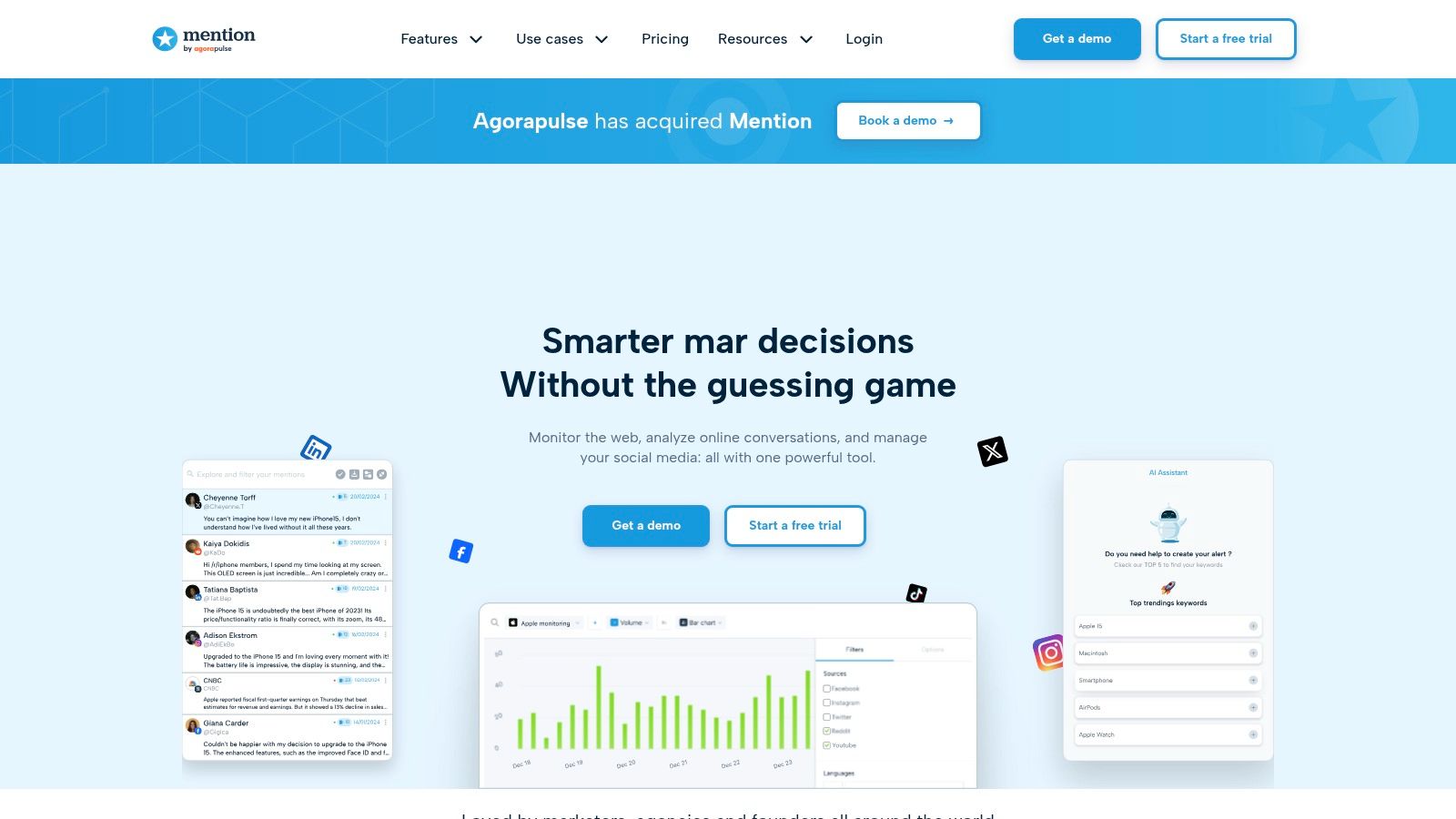
Its alert system is where it shines. At BillyBuzz, we apply the same principle of monitoring beyond our brand name. We track key phrases our target audience uses, which helps us join relevant conversations and provide value. Mention is a listening-first tool, a philosophy we share in our guide to the top social monitoring tools for startups in 2024. This proactive approach lets you shape the narrative instead of just reacting to it.
Key Details & Takeaways
- Best For: Startups, SMBs, and agencies needing an affordable, user-friendly tool for brand and competitor monitoring.
- Pricing: Starts at $49/month for the Solo plan. A 14-day free trial is available.
- Key Feature: The real-time Alert System gives you instant notifications for your keywords, allowing for rapid response.
- Limitation: It’s excellent for listening, but its publishing and review management features are more basic than all-in-one platforms.
Visit Website: https://mention.com
11. SOCi
SOCi is built for multi-location brands like franchises, making it one of the best online reputation management tools for that specific niche. It solves the "central control vs. local authenticity" problem by providing a hub for corporate to manage reviews and social media while empowering local managers to engage with their communities.
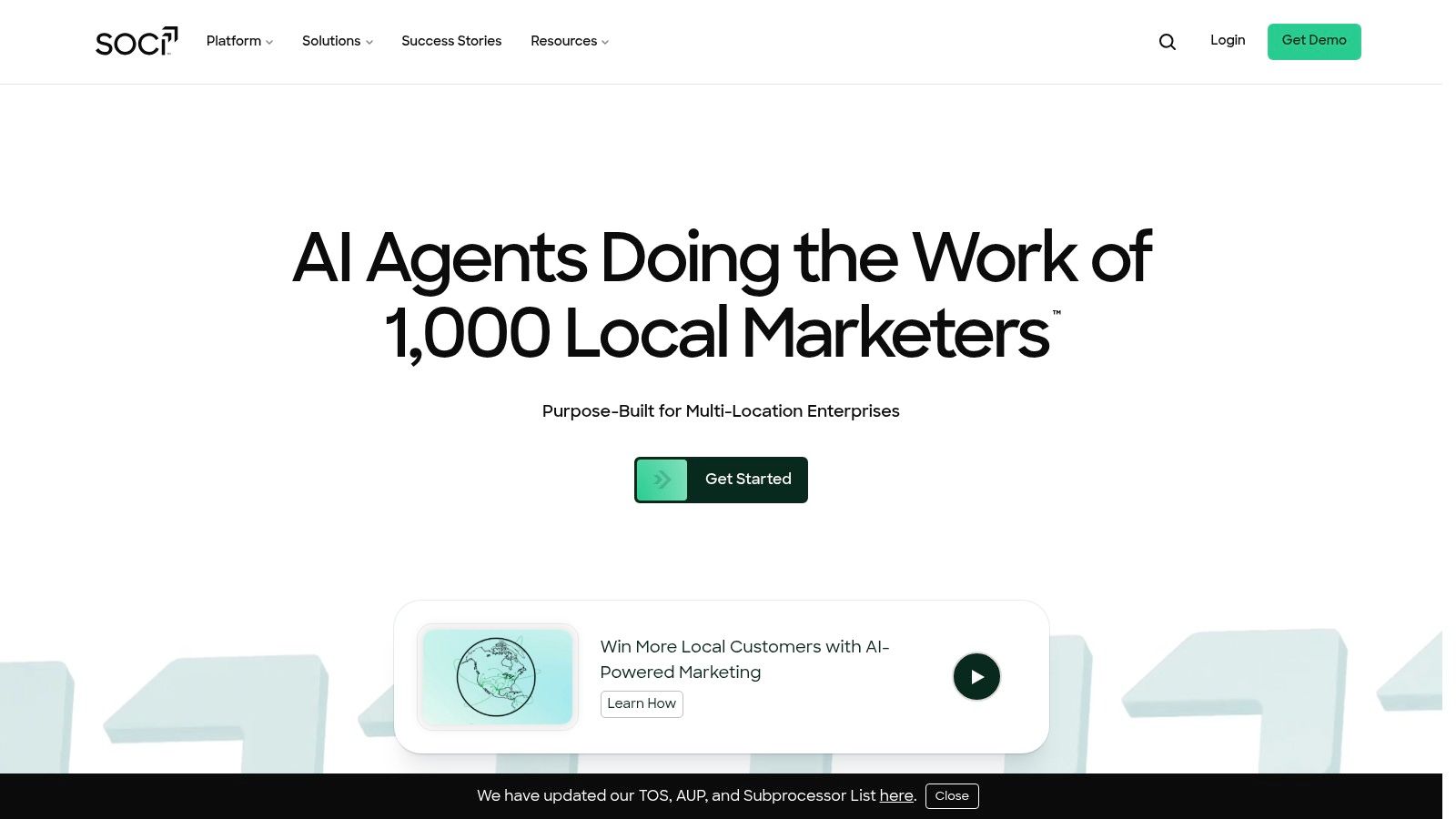
Its workflow management is its superpower. Corporate can set up approval queues and response templates to maintain brand safety. We see huge value in this tiered approach. As a founder, you can create a scrappy version of this using a dedicated Slack channel. Have junior team members post their draft responses for a quick review from a senior member before they go live. It’s a simple, effective governance workflow that costs nothing.
Key Details & Takeaways
- Best For: Multi-location businesses and franchises that need to scale local marketing and reputation.
- Pricing: Quote-based. You have to schedule a demo.
- Key Feature: The centralized-to-local workflow allows for brand consistency without sacrificing local authenticity.
- Limitation: Overkill and not cost-effective for single-location businesses or most startups.
Visit Website: https://www.meetsoci.com
12. G2 Online Reputation Management Category
This isn't a tool, but it's an indispensable resource. G2's Online Reputation Management category is a marketplace where you can compare dozens of platforms side-by-side based on real user reviews. It's the first place you should go to build your shortlist of the best online reputation management tools.
The filtering is powerful. You can drill down by company size, industry, and specific features like "Sentiment Analysis." At BillyBuzz, we use G2 to sanity-check our tool choices. We read the user-generated pros and cons to see if they align with our priorities. Pro-tip: filter for tools that integrate with your existing tech stack (like Slack or your CRM) to ensure a smooth workflow. This meta-tool will save you hours of research.
Key Details & Takeaways
- Best For: Any team in the research phase needing to compare a wide array of tools and get unbiased user feedback.
- Pricing: Free to browse.
- Key Feature: The comparison tool lets you see a side-by-side analysis of ratings, features, and user satisfaction.
- Limitation: Reviews can sometimes be incentivized, so read them critically. Always double-check pricing and features on the vendor's actual website.
Visit Website: https://www.g2.com/categories/online-reputation-management
Top 12 Online Reputation Management Tools Comparison
| Product | Key Features | User Experience & Quality | Value Proposition | Target Audience | Price Range |
|---|---|---|---|---|---|
| BillyBuzz | AI context-aware Reddit monitoring; real-time alerts (Email, Slack, Discord); AI reply suggestions | Saves time; proven lead generation; user-friendly | Unlocks Reddit leads with advanced AI; boosts SEO value | Startups, growing teams | $19–$99/month (annual billing) |
| Reputation | Review & listings management; social publishing; analytics dashboard | Enterprise-grade; deep analytics | Comprehensive for multi-location brands | Large enterprises, multi-location businesses | Quote-based |
| Birdeye | AI review solicitation; listings accuracy; unified messaging; social monitoring | Broad toolkit; mobile app; integrations | All-in-one CX platform for SMBs and enterprises | SMBs to enterprises | Quote-based |
| Podium | AI review responses; SMS marketing; omnichannel inbox; call summaries | Focused on revenue through reviews & messaging | Lead conversion and reputation for local businesses | Local businesses | Quote-based |
| Yext | Listings sync; review monitoring; social posting; local SEO pages | Clear SMB pricing; scalable | Digital presence management for single & multi-locations | SMBs & multi-location brands | Published SMB prices + enterprise quotes |
| Sprout Social | Social media mgmt; review & location monitoring; social listening (add-on) | Polished UI; strong reporting | Combines social and reputation management | SMBs to enterprises | Per-seat pricing |
| Brandwatch | Advanced social listening; sentiment & topic detection; APIs; training | Powerful analytics; enterprise focus | Deep consumer insights and alerting | Large teams, enterprises | Enterprise pricing |
| Meltwater | Social & media monitoring; news sources; sentiment tracking; API | Wide coverage; enterprise support | Reputation mgmt with premium content integration | Enterprises | Custom pricing |
| Brand24 | Real-time mentions; AI sentiment/emotion; custom alerts; multi-format reports | Transparent pricing; AI features | Social listening for SMBs-midmarket | SMBs to midmarket companies | Clear pricing; free trial |
| Mention | Alerts for keywords; sentiment analysis; collaboration; social publishing | Affordable; easy signup | Basic web & social monitoring | SMBs, agencies | Lower entry price; free trial |
| SOCi | Review & social mgmt; listings & local pages; analytics; multi-location support | Central governance; scalable | Localized marketing for multi-location brands | Multi-location brands | Quote-based |
| G2 Online Reputation Management | Tool marketplace; user reviews; pricing info; vendor links | Comprehensive data source | Fast shortlist & comparison tool | Buyers/researchers | Free access |
Final Thoughts
Managing your online reputation isn't a defensive chore; it's a proactive growth strategy. The right tools don't just put out fires—they give you the intelligence to build a fire-proof brand. This guide was built from the trenches to give you a founder's perspective on the best online reputation management tools, moving beyond marketing fluff to focus on what actually works for a growing business.
There's no single "best" tool. The right choice depends on your business model, your team's bandwidth, and where your customers spend their time. A local service business will get massive ROI from Podium, while a global brand needs the deep listening of a Brandwatch or Meltwater.
How to Choose Your Tool: A Founder's Framework
Before you sign any annual contract, run through this checklist. It's the exact process we use to evaluate any new tool.
- Define Your Primary Goal: Are you trying to generate more positive reviews on G2 and Google? Or are you trying to find and engage potential customers in niche communities? Your goal dictates your tool. For proactive brand building, look at review-focused platforms. For community-led growth, look at listening tools.
- Identify Your Core Channels: Where do your customers actually talk? For us at BillyBuzz, we know our audience of founders and marketers lives on Reddit, specific tech forums, and LinkedIn. So we prioritized tools that excel there. We set up alerts for subreddits like
r/startupsandr/SaaSto catch conversations the moment they happen. Don't pay for enterprise-level social monitoring if your customers are all on Trustpilot. - Assess Your Team's Capacity: Be brutally honest. Do you have someone who can dedicate a few hours a week to this? An all-in-one suite is powerful but demands management. A more focused, automated tool might give a solo founder a better ROI on their most precious resource: time.
- Run a Pilot Program: Always use the free trial. Set up the exact keyword alerts you'd use day-to-day. Connect your actual review profiles. See if the insights it provides are genuinely useful or just more noise. If it doesn't fit into your workflow during the trial, it never will.
Putting Your ORM Strategy into Action
Once you pick a tool, execution is everything.
First, establish clear ownership. Who on your team is responsible for monitoring alerts and who is empowered to respond? Create a simple playbook with pre-approved response templates for positive, neutral, and negative feedback. This ensures speed and a consistent brand voice.
Second, configure your alerts with surgical precision. Broad alerts are useless. Get specific. Inside BillyBuzz, we use boolean operators to hone in on what matters: ("BillyBuzz" OR "billybuzz.com") AND ("review" OR "pricing" OR "alternative") NOT ("job" OR "hiring"). This filters out 90% of the noise and surfaces high-intent conversations.
Finally, remember that the tool is just a means to an end. The real goal is to listen, learn, and build a better business. Use the feedback to inform your product roadmap. Use the praise to fire up your team. Your online reputation is just a reflection of your customer's experience. The best tools simply help you see that reflection more clearly.
Ready to stop guessing what people are saying and start turning conversations into customers? We built BillyBuzz for founders like us—people who need powerful monitoring without the enterprise price tag. It's designed to find high-intent leads in the communities where your future customers are already talking. See how BillyBuzz can help you take control of your online reputation today.
